You’re worth nothing,” Colin’s stepfather used to tell him as a child. Even now, sleeping rough on the streets of Manchester, the words haunt him; as a child he started believing it himself, and is still racked with self-doubt.
It’s easier not to think what demons might be plaguing a person sleeping rough. Much simpler to keep walking, pass them by: out of sight, out of mind. It’s the natural response, says Alex Greenhalgh, co-founder of social enterprise People of the Streets.
“The norm is being ignored or sidelined,” he says. “Or pitied with an awkward smile. It’s a totally isolating experience.”
The one perspective nobody ever sees, says Greenhalgh, is the one that really matters: that of the person in the doorway, the man or woman inside the sleeping bag, and the world as they see it looking out.
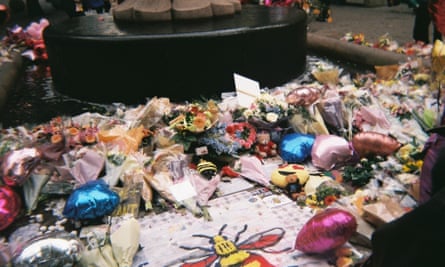
So Greenhalgh, 22, has come straight out of university and created Stories of the Streets – part fundraiser, part social art project – to turn the tables. Working with local homeless charities and support networks, first in Nottingham, where he was studying, and most recently in Manchester, the project puts disposable cameras into the hands of people sleeping rough and encourages them to capture the world as they see it. The pictures are then developed, framed, and put on sale in a public exhibition, with a share of the proceeds going to the street photographer.
The latest photos went on display last week, in the Manchester Arndale shopping centre. They range from some of Manchester’s most iconic buildings to abstractions of detail: a pair of shoes, a lighter, cracks of light through blinds in some unknown darkened room.
This isn’t a rescue operation, nor does it put a roof over someone’s head but one of the photographers, Omar Itani, 23, who has been in and out of sheltered accommodation and been forced to sleep rough, says that the project has real power.
“If you give a homeless person a camera they will look at the city around them in a different way,” he says. “It freezes time for a second. People don’t understand the power of photography. It makes you stop and think; there’s a whole city around you, what are you doing there?”
It’s taken a huge amount of work, thought and ethical balancing to get to this point, says Greenhalgh, whose degree in industrial economics wasn’t much preparation for a third sector enterprise. “We had to work out how to get the money to people without just handing over cash directly,” he says. “Eventually we worked out the best way was to do ‘deals’ with shelters and charities like Emmanuel House in Nottingham, and Barnabus and Big Issue North in Manchester.”
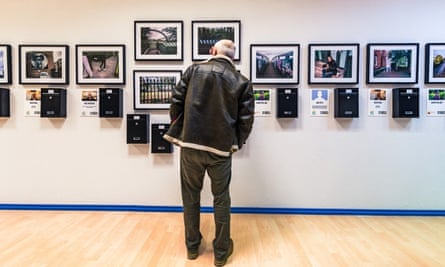
Those deals see that money raised from photo sales is transferred into the accounts of shelters and charities and allocated to photographers to access essential items and services, even training schemes and courses.
Larger photos sell at £25, smaller ones at £15. In each case the photographer receives £10. Some have more than one photo exhibited.
Greenhalgh admits the business model is still being perfected. He hopes to do this before he brings the project to London and ultimately he aims to have photo exhibitions all over the country via Stories of the Streets franchises.
“We feel this is an important space in the charity world,” says Ollie Bream McIntosh, a member of the People of the Streets team. “Lots of people focus on the support and emergency services aspects of homelessness, which are incredibly important. But there doesn’t seem to be much work being done on changing the perceptions of average citizens, which we see as being fundamental to the problem. This is what we are about: changing minds.”

Millie Fijalkowski works as a session leader at the Beacon drop-in centre at Manchester-based homeless charity Barnabus – and is one of the people on the frontline distributing and collecting cameras. She admits that her own mind has been changed by being part of the project. “One of the gentlemen I found had worked as a landscape gardener for the National Trust, another is a painter, another trained and bred horses, and one of our female participants was a model,” she says. “It is difficult to walk past someone who is homeless and consider that this may only be representative of a fraction of their life, and that prior to this there may be little to distinguish them from me and you.”
Colin still feels the biting words of his stepfather as he treads the streets of Manchester. But he has had some relief from their sharpness thanks to Stories of the Streets. When he attended the launch party and saw people not only appreciating his work, but showing an interest in buying it, it came as a boost to his beleaguered self-esteem.
“He said, ‘I’m really proud of myself. I haven’t felt like this in a very, very long time’,” recalls Greenhalgh.
Stories of the Streets exhibition, at the Arndale shopping centre, Manchester city centre, runs until 22 July. More details at peopleofthestreets.co.uk
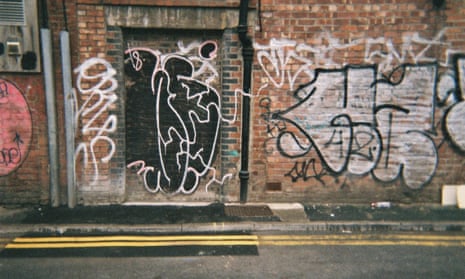

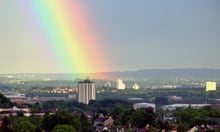


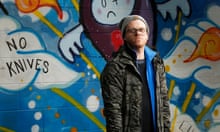


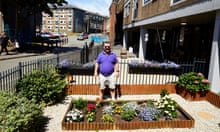


Comments (…)
Sign in or create your Guardian account to join the discussion